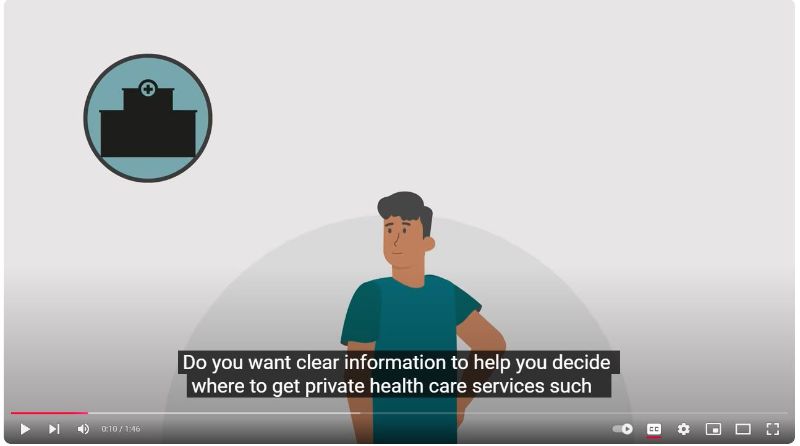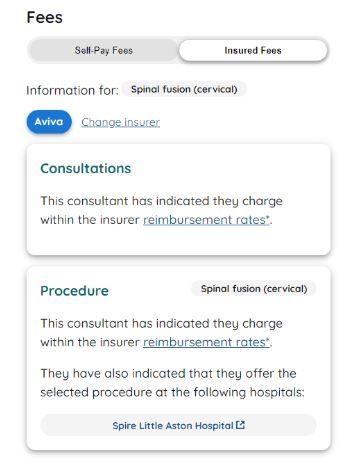Our website is designed to help you make informed decisions about your treatment in a private hospital. This guide explains how we can do that (and what we can't do).*
I'm new to private healthcare, what should I do?

If you’re new to private healthcare, we recommend you start your journey with our short animations:
- How can PHIN help me with my choice of independent provider and consultant?
- Who carries out my private healthcare treatment?
- Where do I get private healthcare?
Or our Patient journey infographic, which describes what using private healthcare like for a patient?
We also have a guide for patients whose treatment is being paid for by the NHS
How can PHIN’s website help me?
1. Allow you to look up hospitals and consultants
You can use the search function (which looks like the picture below) on our homepage to get more information about individual hospitals and consultants.
If you know the name of the consultant or hospital you are interested in then click on name first. Otherwise add your postcode to search. Adding a specialty or procedure will help narrow down the results.

The hospital profiles allow you to see information such as:
- patient feedback scores
- the hospital's rating from the regulator
- the total number of patients admitted
- the facilities available
Hospitals are required to submit this information to PHIN and if the hospital profile does not contain this information it means PHIN has not yet received it.
Consultants also have their own profiles. These can tell you about:
- the specific procedures they carry out
- how experienced they are at a particular procedure (total admissions)
- and often other information too, such as patient experience and satisfaction, the consultant's potential fees and their contact details.
- fees
What information is covered?
Consultants are only required to submit information about their fees, but we encourage them to provide more details to help make patient choices more informed. If a consultant’s profile is blank or seems incomplete, this is because they have not supplied the information to PHIN.
Where consultants have supplied contact information, patients can use the contact card in the profiles to email or call them.
Hospital and consultant profiles provide information for the most recent 12 months for which we have data (or less if they have been operating for less than a year). Patient satisfaction scores are for 36 months (to allow enough responses to be collected) and Patient Reported Outcome Measures (PROMS) are for a year, but are a year behind the other measures (to allow for the time it takes to collect PROMs especially after a procedure). This information is updated every three months.
We currently have profiles for over 12,000 consultants who offer surgery/interventions.
We have also added anaesthetist fees data and are working with consultant physicians to add data about them.
More about hospital and consultant profiles
To learn more about the information in our hospital and consultant profiles see:
- About PHIN's consultant profiles and how to use them
- About PHIN's hospital profiles and how to use them
Improve your search results
Including the specialty or procedure in your search can help you narrow the results down and identify specific procedure fees, but we understand that not everyone has the medical knowledge to do so, and that not everyone uses the same terms, so this is optional.
NHS data
We work with the NHS to ensure as much information about the UK healthcare system as possible is available. We publish limited NHS data for hospital sites and consultants’ NHS work in our data sheets.
2. Provide guides to private healthcare
You can use the guides in our Help and advice section to find out more about how the private system works in the UK including:
- a comprehensive guide to private healthcare in the UK
- using private medical insurance or paying for your treatment directly
- finding out more about the in-patient procedures that are available
- understanding hospital and consultant profiles
- making a complaint
- how PHIN works
3. Help you stay up to date with private healthcare
We post regular updates on our News and Views section about PHIN and wider industry stories. There are two news reels on our homepage. One is for patients and includes patient case studies, and the other one shows how we are working with the healthcare sector to help patients.
We publish our Quarterly Market Updates in this section, These share key information about the private healthcare sector, including the number of admissions, how many of those are paid for through insurance and how many are self-paid. It also breaks the information down to devolved nation and regional levels.
Those who are interested in looking at this sort of information in a more detailed way should visit the Our data section of the website, where you can download spreadsheets on:
- Hospital Coverage
- Volume and length of stay
- Patient Feedback
- Hospital Reported Adverse Events
- Infections
- Patient-reported outcome measures (health impact)
- Never events
- Consultant references
- Consultant self-pay fees.
What can't PHIN’s website do?
1. Rank healthcare providers
We provide data and guidance to help you better understand the UK’s private healthcare system, so that you can make better informed decisions. We do not rank hospitals, consultants or insurance providers.
2. Help diagnose your condition
Our website cannot help give you a diagnosis. Symptoms vary widely and it could be misleading if we tried to make it possible to search for them. You should always seek professional medical advice to assess any symptoms – normally through your GP.
3. Inform you about outpatient, mental health, sports medicine, physiotherapy or international services information
Hospitals currently only supply us with data for acute medical and surgical day-case and inpatient private treatment in the UK, so we are unable to provide information on other aspects of healthcare or international services.
4. Health assessments
We do not collect information on health assessments, such as allergy tests, so are unable to provide information on these.
5. Verbatim patient reviews
Although we provide information on patient feedback, we do not publish individual patient comments. Nor can we accept feedback direct from patients. The feedback we publish comes from hospital surveys of patients.
6. Help with complaints about private healthcare
We are unable to help with individual complaints, other than to advise who to contact. See our complaints guide for more information.
7. Book appointments
We do not currently offer the facility to book appointments directly from our website. You can get contact information for the hospitals and consultants you want to book with on their profiles.
8. Show insurance companies associated with hospitals
We do not publish information about which hospitals work with different insurance companies. If you are interested in using a particular hospital, you should check with your insurance company first.
We started publishing information about the insurers different consultants work with in 2024. As this is a new option, not every consultant has added this data yet, but we are working to encourage more to do so.
Where available, the insurance related data appears in the consultant profile, for example:

Other places to get help
We can’t help every patient in every case, so we’ve put together a page of links to other organisations who might be better placed to help.
What are my next steps to get private healthcare?
If you'd like more help understanding private healthcare and your options (including how you pay for it), or the procedure/operation you might undergo, we recommend you visit our Help and Advice section where we have a wide selection of guides that can help you.
If you're interested in knowing more about the consultants and/or hospitals that can provide your healthcare, then use the search bar at the top of each page (or on the homepage www.phin.org.uk) and you can view profiles with more information.
* Note: This page tells you how PHIN can help you but the website also gives you access to detailed datasheets of outcomes by hospital and consultant, as well as the facility to check measures on an individual site and clinician basis.
